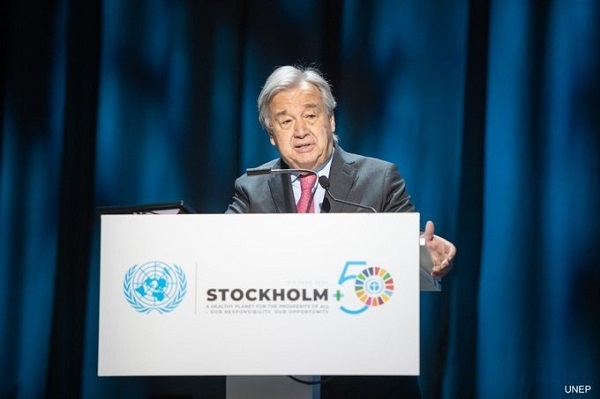
Stockholm, (Asian independent) Global wellbeing is at risk and it’s in large part because “we haven’t kept our promises on the environment”, UN Secretary-General Antonio Guterres warned at the Stockholm+50 to spur urgent action for a healthy planet for the prosperity of all.
Although there have been successes in protecting the planet since 1972, including rescuing the ozone layer, Guterres warned that “earth’s natural systems cannot keep up with our demands”.
“Lead us out of this mess,” he urged delegates at the Swedish summit convened by the UN General Assembly, in a call for action against a “triple planetary crisis” that’s been caused by the climate emergency, “that is killing and displacing ever more people each year”, biodiversity loss, which threatens “more than three billion people”, and pollution and waste, “that is costing some nine million lives a year”.
All nations should do more to protect the basic human right to a clean, healthy environment for everyone, Guterres insisted, focusing in particular on “poor communities, women and girls, indigenous peoples and the generations to come”.
Fifty years after Sweden hosted the first-ever UN Conference on the Human Environment, and with the world facing a triple planetary crisis of climate change, biodiversity loss and pollution, governments, civil society, young people and the private sector on Thursday gathered for an international meeting, Stockholm+50, to spur urgent action for a healthy planet for the prosperity of all.
Thousands of participants are attending the two-day meeting, convened by the UN and co-hosted by Sweden and Kenya, with speakers including Sweden’s King Carl XVI Gustaf, Swedish Prime Minister Magdalena Andersson, Kenyan President Uhuru Kenyatta, President Azali Assoumani of Comoros, President Mohamed al-Menfi of Libya, and John Kerry, US Special Presidential Envoy for Climate.
“The crisis for our environment and climate affects people all around the world. The developed countries are the ones who pollute and have polluted the most. But the poorest are hit the hardest,” Prime Minister Andersson said in her opening remarks.
“We must ensure that no country is left behind. And we must ensure that no person is left behind. The climate transition can only be done if it’s made in a social and inclusive way. This is not just an option. This is our moral obligation.”
Speakers stressed the need for decisive action to transform the global economy and humanity’s relationship with nature for people and planet to thrive.
“We have an exceptional opportunity to turn climate and environmental commitments into action, if we work together as a community of nations. Heightened ambition in financing and implementation should be at the core of these actions,a said President Kenyatta of Kenya, which has hosted the UN Environment Programme (UNEP) since it was established following the 1972 Stockholm Conference.
Reiterating that the principles outlined during the 1972 Stockholm conference remain relevant even today, India has said the world needs to ensure that when the Stockholm conference turns 75, it can look back with satisfaction of our collective action — to leave no one behind.
Union Environment Minister Bhupender Yadav said: “Climate justice aims at providing a level-playing field to all communities across the world by empowering them with financial and technology from interventions.”
He then listed India’s achievements vis-a-vis climate actions in both domestic and international arena, especially that done in partnership with other countries.
The Minister concluded his four-minute India statement by saying: “We need to ensure that when the Stockholm conference turns 75, it can look back with satisfaction of our collective action. To leave no one behind.”







